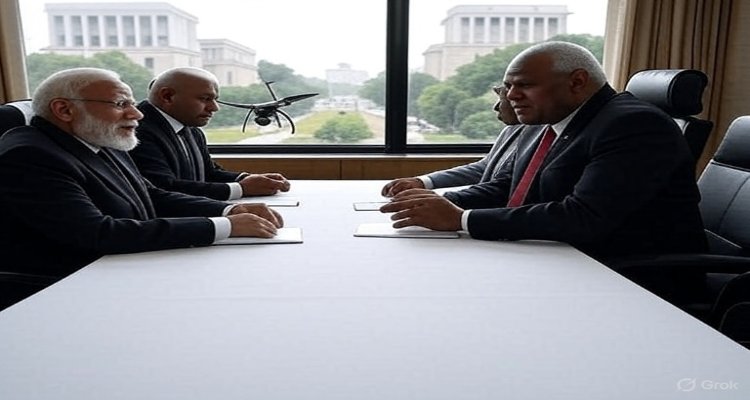India, Fiji Agree to Further Deepen Defence Ties

India and Fiji strengthen defence, trade, and development ties with new agreements covering agriculture, health, technology, and capacity building.
Introduction: A New Chapter in Indo-Fijian Partnership
In a significant diplomatic development, India and Fiji have taken a decisive step toward deepening their defence and strategic partnership. During Prime Minister Narendra Modi’s meeting with Fijian Prime Minister Sitiveni Ligamamada Rabuka in New Delhi, the two nations unveiled a comprehensive action plan to boost cooperation across security, trade, technology, and cultural ties. The visit, Rabuka’s first in his current role, underscored Fiji’s intent to reinforce its relationship with India at a time when the Indo-Pacific region is witnessing shifting geopolitical dynamics.
Context & Background: A Shared History and Strategic Geography
India and Fiji’s relationship extends beyond traditional diplomacy, rooted in historical migration and shared people-to-people ties. Between 1879 and 1916, more than 60,000 Indian indentured laborers, known as Girmitiyas, settled in Fiji, shaping its multicultural identity and economy. Today, descendants of these communities play a vital role in Fiji’s political, cultural, and economic fabric.
Strategically located in the South Pacific, Fiji occupies a pivotal position in maritime security and regional connectivity. India’s engagement with Fiji complements its “Act East” policy, aligning with New Delhi’s broader Indo-Pacific strategy to build resilient partnerships with island nations.
Main Developments: Defence, Trade, and Beyond
The Modi-Rabuka talks produced a series of forward-looking agreements, reflecting both nations’ ambition to move beyond symbolic ties into practical cooperation. Key highlights include:
- Defence & Security: A formal action plan to enhance defence ties, particularly in maritime security, was firmed up. This is crucial as the Pacific region faces growing challenges from illegal fishing, climate change, and great-power competition.
- Agriculture & Technology: India announced the gifting of 12 agricultural drones and two mobile soil testing laboratories under its Grant-in-Aid Programme. These innovations are expected to modernize Fiji’s sugar industry, a sector central to its economy.
- Trade & Investment: Both leaders acknowledged rising trade volumes but stressed the untapped potential for deeper economic engagement. Notably, Fiji granted market access to Indian ghee, a symbolic yet commercially important step.
- Development Agreements: Multiple MoUs were signed, covering a wide range of sectors:
- Collaboration between Fiji Development Bank and NABARD to strengthen rural development and financial inclusion.
- Partnership between Bureau of Indian Standards and Fiji’s DNTMS to harmonize trade and standardization.
- Capacity-building and digital skills training through NIELIT and Pacific Polytechnic.
- A business cooperation pact between CII and Fiji Commerce & Employers Federation.
- Health sector support via an agreement between HLL Lifecare Ltd. and Fiji’s Ministry of Health to supply affordable medicines under India’s Jan Aushadhi scheme.
Expert Insight & Public Reaction
Regional analysts view the agreements as a strategic win for both nations. For India, strengthening ties with Fiji provides a gateway to the Pacific Islands, a region gaining increasing attention from global powers including China and the United States.
Dr. Rajiv Bhatia, a former Indian diplomat and Indo-Pacific expert, noted, “India’s outreach to Fiji is more than bilateral—it’s part of a larger effort to build credible partnerships in the Pacific. Defence cooperation and capacity building ensure India’s presence in a region often overlooked in mainstream diplomacy.”
In Fiji, the agreements were welcomed as a boost to national development. Local media highlighted the agricultural drones and soil testing labs as critical tools for modernizing farming practices and enhancing food security.
Impact & Implications: Building Resilience and Regional Influence
The strengthened India-Fiji partnership has implications that extend far beyond bilateral trade.
- For Fiji: Access to affordable medicines, agricultural technology, and digital skills training will contribute to economic resilience and improve public welfare.
- For India: The partnership underscores New Delhi’s ambition to expand its footprint in the Pacific, enhancing its role in maritime security, sustainable development, and regional diplomacy.
- For the Indo-Pacific: Closer India-Fiji ties add balance to the strategic equation in a region where global powers are competing for influence. This alignment also supports climate resilience initiatives, a priority for island nations vulnerable to rising sea levels.
Conclusion: A Partnership Anchored in History, Geared for the Future
India and Fiji’s renewed commitment to defence and development cooperation reflects a partnership that is both historical and forward-looking. By integrating defence collaboration with agriculture, health, technology, and trade, the two nations have set the stage for a holistic relationship that goes beyond diplomacy into everyday impact.
As PM Modi and PM Rabuka emphasized, the journey ahead is about building a broad-based, inclusive, and resilient partnership. Rooted in shared values and strengthened by new agreements, India and Fiji are poised to play a more significant role in shaping not just their bilateral future, but the wider Indo-Pacific landscape.
Disclaimer:This article is based on publicly available diplomatic updates and official announcements. It is intended for informational purposes and does not represent official government statements.










